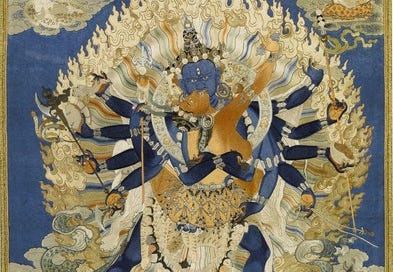Before I return to Caillois, and apropos Klossowski: ‘What does thinking come down to when thought cuts through words and things to constitute new forms of life’?1
It is the one thing one must be open and receptive to as a thinker: love —broadly, φιλία— but not as philosophy, which can be stiff at the joints —and is comprised entirely of them— but as biophilia, which in some sense entails overcoming any love of ‘knowledge’, or at least of knowledge understood as certainty, for love of life. I have very little to offer by way of knowledge —as do most of those to whom people appeal in that capacity (and they generally know it). The purpose of thinking was, in my case, always erotic: in the same sense it was to the school of thinkers I belong with —not to—, not the vitalists but the biophiliacs; people who do not think or behave in boxes, within or without them, but who sometimes s[h]it in them, like cats.
The risk with this sort of approach is always formal, in that it tends towards asystematicity and dissolution. It is difficult to build anything like a ‘corpus’ or a ‘collected works’ on ἐνθουσιασμός, so one does not rely, or not overly, on foundations or belonging but on transitions and longing, of which we wrote already —and which will merit further consideration for our arguments on power.2
So there is a loss in self-possession that can translate into self-mastery. There is a third path where one does not submit to the Fates, nor is one dragged by them, but in which one acknowledges them and tries to learn to read the wind to reap the whirlwind, as it were. I do not meddle with the Fates directly, but I incline them and have them do the meddling for me. They are more than capable defenestrators and they do take care of business, in their own time, which is not our own.
So, to an exceptional degree, I am a person of Fortune in all of its facets. For every seeming setback I am given an enormously improbable affordance. Most of my blessings are in disguise, and for good reason. Things will probably not end badly for me, but they may end boldly. I will embody Fate, in the same way that I currently embody other principles.
So if you’ve made it this far, here’s the secret. In Future Notes on Orphism I mention Durkheim’s distinction between a sacred right and left where the first is —I’ll repeat it— linked to ‘social cohesion, guaranteeing rules and taboos’, while the other “consists in outbursts of violation of the rules of life”. There is a time and a place for each, but you cannot have one without the other.
To help situate our things in our Orphic frame, I will call them the Apollonian and Dionysian sacred, respectively, and we will revisit them in these more synthetic capacities in due course. You may have heard of them before in occultist terms as Right and Left Hand Paths. Their source is, however, in ‘corporeal spirituality’, or Tantra, where the Right and Left are known as dakshina and vama.
So political persuasion is bog indifferent, for two reasons: one can only be what one is, and one must practice —and master— both. (If this sentence reads strangely that is very much on purpose). “Tantra is […] a means of harnessing and releasing myriad forms of power, both supernatural and worldly. According to the Tantric worldview, the fabric of the phenomenal world, characterized by its fluidity and malleability, can be transformed rather than transcended.”3 Like I said, the challenges and risks involved in this are predominantly formal, in the sense I describe as the panic (and should perhaps consider as the pranic, too).4 That is at the very core of the process of self-transformation I am documenting here, and at the heart of yours. A lot will depend on your learning to b[reath]e as yourself.
So, just a placeholder before we proceed back to Part VIIb, and/or concurrently advance to Part IX (I could do either, or both): power is plastic, and the Orphic has a lot in common with the Tantric as intuited in a Western context. I’ll be dwelling on this shortly, too, because I’ll be damned if I gave you yet another mimetic crash-course in power. There are plenty of people who can and do that. They are trapped in an eternal return of the same. We, alas, need not be.
Chakrasamvara in union with Vajrayogini. 18th century. Embroidery on silk. Private collection.
My free translation from the Spanish preface to Pierre Klossowski’s Un tan funesto deseo, (Un si funeste desir, 2008 [1963], trans. by Julián Manuel Fava and Lucía Ana Belloro, 2008, [1963]).
As I wrote at the time: “Grief is a halfway house between possession and addiction; longing a safehouse for both passion and aggression.” (Which is why we will be doing that survey on power —which can be read as passion— and aggression).
The italics are mine; the source, the British Museum’s definitive tome on Tantrism, Tantra: Enlightenment to Revolution, by Imma Ramos. London: Thames and Hudson, 2020, p. 272. See also my essay on nymphification.
See also, my essay on terror and cathexis.




